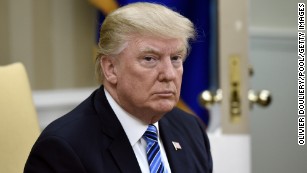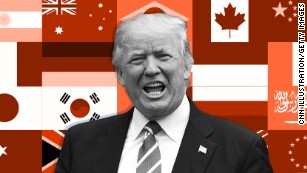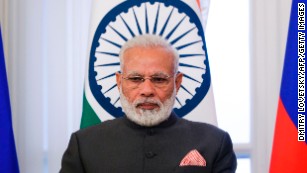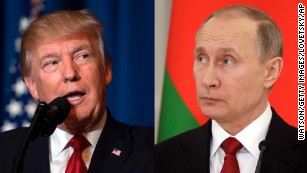Arriving in Europe, Trump faces stiff challenge in Merkel, Putin showdowns
Warsaw, Poland (CNN)When
President Donald Trump visited Europe six weeks ago, he and his
counterparts parted ways atop a Sicilian cliff feeling agitated and
bruised following a long set of disagreements.
Now, the stakes may be even higher.
Returning
to the continent late Wednesday, Trump and those same European leaders
will give it another go, with expectations of fostering a newly warm
relationship far lower. Instead, both sides expect further clashes
between the US President and leaders like German Chancellor Angela
Merkel, who is convening this year's Group of Twenty meetings in her
hometown, Hamburg.
The northern
port city in Germany is also the setting for Trump's first in-person
meeting Friday with Russian President Vladimir Putin, a closely watched
session that has taken on greater significance given the swirl of
controversy about Russia's cyber meddling in last year's election.
Hamburg
is expected to play host to confrontations over a broad slate of issues
where Trump and his European allies have disagreed, mainly because
Merkel has ensured those sticking points -- including trade, climate,
and migration -- feature prominently on the G20 agenda. Putin, and the
US relationship with Russia and future of NATO, also looms large.
"The
big question is whether he will repair some of the damage from the
stops in Europe in May, or will they be compounded?" said Jeff Rathke, a
senior fellow at the Center for Strategic and International Studies in
Washington.
Before Trump arrives in
Germany he's making a 15-hours-long stop in Poland, a country where
he's likely to receive a positive welcome from a conservative government
and a largely pro-American population.
Air Force One touched down at the Warsaw Chopin Airport just after 10 p.m. Wednesday.
On
Thursday, he's due to address a regional summit of Eastern European
leaders and deliver an outdoor speech in Krasinski Square, the site of a
monument to Poles who fought to liberate Warsaw from German occupation
in World War II. White House officials said the speech would spell out,
in broad terms, Trump's vision for transatlantic ties.
Poland's
right-wing government has caused anxiety in Brussels, where EU leaders
fear proposed constitutional reforms and a crackdown on opposition media
could amount to democratic backsliding. But those concerns didn't
prevent Trump from scheduling a stop in the country, where he's expected
to praise Poland's success in meeting its NATO defense spending pledge
and tout new exports of US liquid natural gas in a bid to wean the
country from Russian-produced energy.
And
while Poles, like most of the world, continue to regard Trump with some
skepticism -- mainly due to his unclear intentions toward Russia, with
which they share a border -- the country's population is largely
favorable to the United States on the whole, meaning he's expecting to
be met with cheering crowds during his brief stay.
The
visit to a friendly capital is similar to Trump's decision in May to
make Saudi Arabia his first stop abroad, where he was given an elaborate
royal welcome before traveling onward to more fraught destinations.
Cold welcome for Trump in Germany
But
the plaudits are unlikely to follow Trump from Poland to the G20, which
brings together the leaders of the world's largest economies.
Organizers expect large-scale protests to accompany the summit. But even
closeted inside the confines of the Hamburg Messe conference hall,
Trump is unlikely to find much agreement on his agenda.
Merkel
has designed her summit to highlight areas where she's already rowed
with Trump, including on trade. Trump's administration has castigated
her country's trade surplus, to be met largely by German scoffing. Last
week, White House officials were angered when a video feed of US
Commerce Secretary Wilbur Ross speaking to a Berlin economic conference
about the trade dispute cut off mid-speech.
Trump tweeted about trade deals Wednesday morning.
"The United States made some of the worst Trade Deals in world history," Trump wrote before leaving for his trip. "Why should we continue these deals with countries that do not help us?"
In
May, leaders chafed at the lecture Trump delivered on defense spending
during talks at NATO headquarters in Brussels. Later that week, at the
G7 in Italy, Trump felt outnumbered, according to people who traveled
with him, and picked on when the other leaders insisted he maintain the
US commitment to the Paris climate accord.
After
his return, Trump announced he was withdrawing from the pact, casting
the 2015 agreement as a humiliation that led other countries to laugh at
the United States.
Merkel,
meanwhile, vented during now-infamous remarks at a campaign event held
inside a Bavarian beer hall that Germany and Europe could no longer rely
on the United States as a steady partner.
Merkel
-- who is running for her fourth term as Chancellor -- hasn't tempered
her tone since then. Previewing the G20 summit last week in remarks to
the German parliament in Berlin, Merkel acknowledged the talks would be
"difficult" and seemed to castigate the isolationist worldview that
Trump has periodically espoused.
"Anyone who thinks the world's problems can be solved with isolationism and protectionism is simply delusional," she said.
She's
included an entire session on climate at the G20 she is hosting, and
has invited leaders from China and India — two of the world's leading
carbon emitters, both of whom say they remain committed to the Paris
accord — for separate meetings in Germany over the last month.
The
goal, according to European diplomats, is to keep Trump isolated on the
climate issue in the hopes he will come in line with the rest of the
world's leaders. If he doesn't, Merkel and other leaders hope to
convince countries like China to take on a new leadership role in that
area.
Meeting Putin for the first time
During
his time in Hamburg, Trump will meet separately with China's President
Xi Jinping, as well as the leaders of eight other countries — an
ambitious agenda whose highlight is Trump's meeting with Putin on Friday
afternoon, their first chance to size each other up since Trump was
elected.
Leaders in Europe hope
Trump will offer assurances that he'll hold Putin to account for the
long list of grievances they hold against the Russian leader — including
provocative cyber activity.
Trump
is also under immense political pressure back home to raise the
election meddling issue during his session with Putin, the logistics of
which were still being sorted out by the White House and the Kremlin
midweek. But multiple senior administration officials and people close
to the White House said they didn't expect Trump to raise the issue, at
least in a significant way, during his talks with Putin. Instead, they
said the civil war in Syria and the crisis in Ukraine would top the
agenda.
That could provide further
grist for tensions between Trump and other world leaders, who fear the
President's past praise of Putin and professed desire to work with the
Russian leader could mean he won't take a hard line on territorial
disputes or cyberattacks.
"As the
President has made clear, he'd like the United States and the entire
West to develop a more constructive relationship with Russia," said H.R.
McMaster, Trump's national security adviser, in a briefing last week.
"But he's also made clear that we will do what is necessary to confront
Russia's destabilizing behavior."
McMaster,
who said there was no set agenda for the meeting, suggested Trump was
open to taking steps that would allow for a better relationship between
Washington and Moscow. But that desire to find areas of agreement has
sparked concern among national security experts, even within Trump's
team, who worry Trump may be unprepared for the calculating and
hyper-prepared Putin.
"If Vladimir
Putin comes in with a big proposal, President Trump's alarm bell better
be going off because it may sound really good, but there well may be
some traps in there," said Steven Pifer, a senior fellow at the
Brookings Institution and a former US ambassador to Ukraine. "It's not
clear that those will be noticeable on the first meeting."
http://edition.cnn.com/2017/07/05/politics/trump-in-europe-merkel-putin-g20/index.html
http://edition.cnn.com/2017/07/05/politics/trump-in-europe-merkel-putin-g20/index.html






Post a Comment